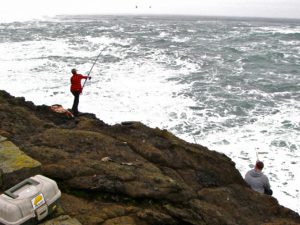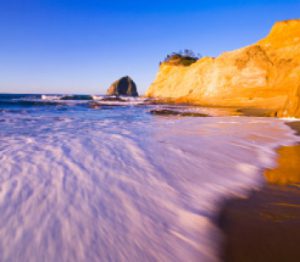Luckily, the writer of this harrowing story survived to tell the tale. Please, dear readers, be careful, and NEVER turn your back on the ocean.
Story by William York
I was vacationing on the Oregon Coast with my wife, my wife’s brother Roy, and Roy’s wife. This was an annual camping trek that we took together every year on New Year’s Day. Roy is 10 years older than I am and was getting ready to retire soon. In spite of our age difference, we enjoyed each other’s company and we became fast friends over the years. He grew up on the Oregon Coast and promised, on this trip, to show me how to catch perch from the shore and wade into the shallows to harvest clams. We were staying in our motor homes at beautiful Harris Beach State Park, north of Brookings, along Highway 101.
The four of us decided to take Roy’s motor home and drive to Lone Ranch, a wayside three miles north of our campsite. We arrived and left our wives in the motor home in the parking lot on the cliffs overlooking the ocean. Roy and I walked about 500 yards to a craggy rock that he was familiar with on the north end of the beach. The rock was situated far enough out into the water where we could stand and cast our lines into the sea.
It was a beautiful sunny morning, but chilly. We were wearing winter clothes and carrying our fishing rods and a tackle box. There were just a few people walking the beach and letting their dogs run. As we climbed up on the rock we could see that the tide was going out and the wind was almost nonexistent. The water was about 10 feet below us, swirling rhythmically against the base of the rock we were standing on. 
The waves were fairly calm, churning through the rocky formations all around us. This is one of those areas on the Oregon Coast that is replete with majestic rock formations of all sizes jutting up above the surface of the ocean. We readied our rods, baited up, and began fishing side-by-side.
We were losing hooks to the rocks on the bottom and losing bait to the ocean swirl, but we weren’t catching fish. Things weren’t going as smoothly as we’d hoped. I had just replaced my third or fourth hook, baited it, and turned at an angle toward the shoreline to cast my bait. My back was to the ocean. Roy was hunched over behind me, attaching a hook to his line with his back to the ocean also.
All at once there was a loud roar. I looked over my shoulder just in time to see a giant sneaker wave, at least 10 feet taller than we were, crashing over us.
The wave literally snatched all 200 pounds of me from atop the rock and placed me in the middle of a churning cauldron about 20 feet out into the ocean. I was immediately forced underwater and disoriented for several seconds. When I came back to the surface I turned toward the rock and saw Roy, still standing there, soaking wet. He had apparently clung to the crags in the rock when he realized what was happening and was able to avoid being washed in.
He was anxiously looking in my direction to see what my situation was. It was at that moment that I saw the second equally large sneaker wave coming from behind him. I watched as the water lifted his body from the rock and tossed him into the ocean as if he were a small stick. Moments later I was once again pushed to the bottom, the unrelenting power of the ocean twisting me like a cigarette in an ashtray on the jagged rocks below the surface.
When once again I came back up, Roy was nowhere in sight. I tried swimming to a nearby rock, but with my heavy clothes and boots on I was making little headway before the waves forced me back into the middle of the cauldron. Each time the waves subsided slightly I would attempt to swim to safety, but the results were always the same. Within a minute I saw Roy’s head appear in the water near the shore and watched him pull himself up on some rocks. He had apparently been swept in on a slightly different angle than I had and was able to cling to the bottom and make his way underwater toward shore in spite of the churning tide. His coat and shirt were totally missing and he had bloody scratches all over his upper body and arms. He immediately made his way to the top of a nearby rock to see where I was.
I was a certified scuba diver with many dives under my belt. I had a great deal of experience in the ocean, some within 10 miles of this spot, with both wetsuit and drysuit. The water was 50 degrees and, without a suit, I knew that if I didn’t get out of this soon I’d be in bigger trouble. I was already very cold and tiring fast. I took off my boots and coat hoping to gain more freedom of movement. I began to otter float on my back in the rough water to try and conserve strength. To this day, I believe that played a large role in keeping me alive. This was a floating technique that I initially learned in the Marine Corps and then relearned in diving classes. Through this whole ordeal Roy was never more than 50 feet from me, but it may as well have been 50 miles as there was no way of me reaching him or him reaching me. As I was weakening I began to fear that he would try to come back into the water to rescue me, which, I’m sure, would have been the end of us both.
By this time there were three or four more guys with Roy who had seen what happened and were trying to help. I heard them frantically asking other people about rope or life preservers, but everyone’s vehicle was at least 500 yards away and I was fading fast. I realized I was in a pattern where the ocean would let me float for 20 seconds or so and then come crashing down on me and violently take me to the bottom and hold me there for another 10 seconds. It was taking all my strength to get back each time to the surface to suck in some air before I was taken down again. I remember thinking, “This is going to be very painful to the people who love me.” Each time I surfaced I struggled to turn myself so that I could see Roy. The look on his face told me that if he failed to save me it would be more than he could bear.
By this time I had been in the water almost 20 minutes. My skin was blue and I had no feeling in my body. As the next wave hit I remember feeling very calm and accepting, knowing that this would be my last breath. Just before the wave shoved me down I saw that Roy and the others had found a long log that was about 10 inches in diameter and they were carrying it to the edge of the water. They were thinking that it would give me something to hang on to if I could get to it and that, hopefully, I wouldn’t get smashed between the log and the rocks. Drifting wood is a major cause of death on the coast, as the water will lift even the largest of logs and fling them toward shore. This vision was the last thing I saw as I went down for what I was sure was the final time. I decided to use the last of my strength to force myself back to the surface one more time in the hope that they had succeeded in getting that log out to where I could grab it.
Miraculously, at the same moment as I broke the surface, another very large wave came in and caught my body in a forward momentum toward a 15-foot wall of jagged rocks on shore. Roy and the others ran to the edge of the rocks and looked down at me. I was thrown into the rocks and momentarily held there by the waves. I was awake, but I could not move. Roy quickly had the others hold on to him by his ankles and they lowered him upside down over the edge of the wall far enough so that he could grab the back of my shirt and hold me there as one or two more waves crashed against us. At the next calm moment they pulled Roy back up and he pulled me with him. To this day I have no idea where Roy and these men found the strength it took to save me. Once on top of the wall of rocks they carried me to a flat area and laid me out. I was blue and could not move, talk, or feel anything, but I was conscious. Several of the people that were standing there stripped my clothes off and two or three of them literally laid on me in an attempt to transfer their body warmth.
By this time my wife had called 911, and, within a few minutes, an emergency medical team arrived with a stretcher to carry me to an ambulance in the parking lot. As they opened the back door and slid me in I remember thinking that it felt like being slid into a pizza oven! It was very warm, which I later found out was an important part of coastal rescue, as hypothermia was always the immediate concern.
The ambulance took me on a 20-minute ride to a hospital in Gold Beach, where they covered me with heated blankets and stuck an IV into my arm. After a few minutes, my wife, Roy, and Roy’s wife were all standing next to my bed looking at me as if they were seeing a ghost that had returned to life.
 In a few minutes, the attending nurse walked up and asked me how I was feeling and placed some newly heated blankets over me. After checking my vitals she looked at us and said, “I want to say two things, speaking as a coastal emergency room nurse: I want you to know that two people in and two people out, alive, NEVER happens.” Then after a slight pause she went on to say, “and from now on, NEVER turn your back to the ocean.”
In a few minutes, the attending nurse walked up and asked me how I was feeling and placed some newly heated blankets over me. After checking my vitals she looked at us and said, “I want to say two things, speaking as a coastal emergency room nurse: I want you to know that two people in and two people out, alive, NEVER happens.” Then after a slight pause she went on to say, “and from now on, NEVER turn your back to the ocean.”
This harrowing experience was truly a lesson learned, and to this day I never turn my back to the ocean and I’m always on the lookout for a sneaker wave. ■




